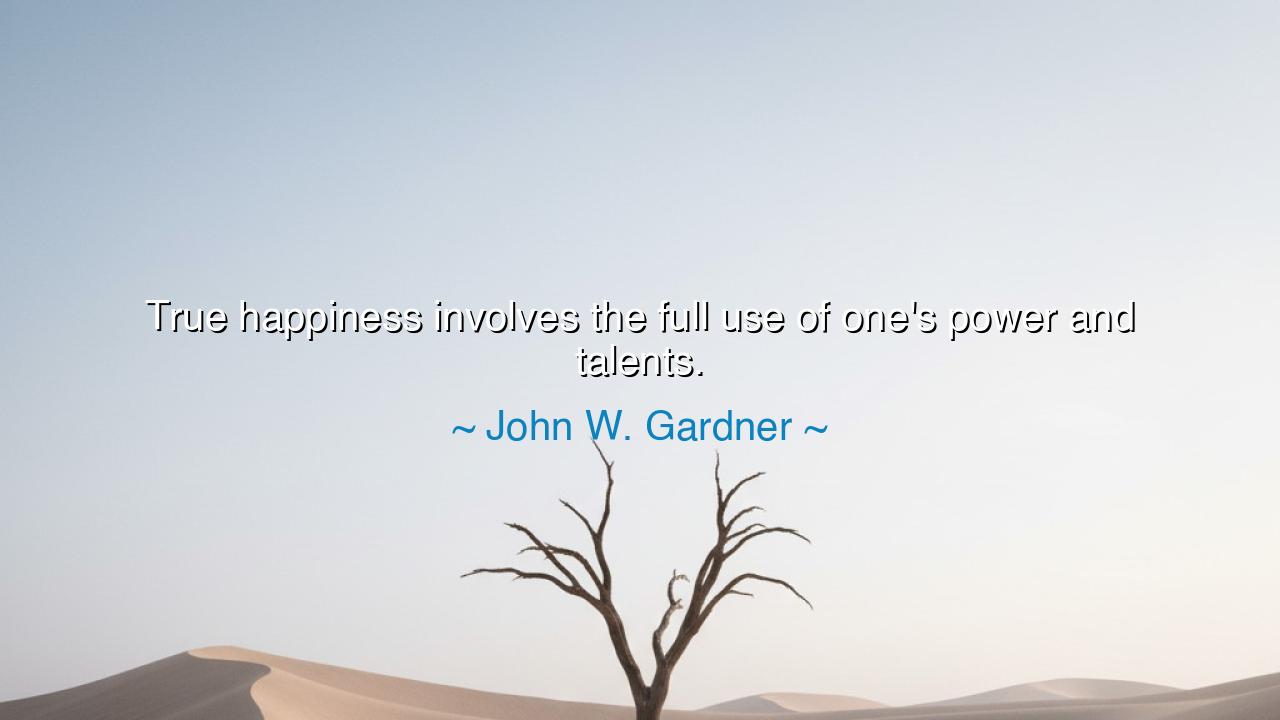
True happiness involves the full use of one's power and talents.






“True happiness involves the full use of one’s power and talents.” – John W. Gardner
From the first dawn of civilization, the sages have sought to understand the nature of happiness — that elusive state for which men have crossed deserts, waged wars, and written poetry. Yet John W. Gardner, the modern philosopher of purpose, speaks a truth as ancient as the stars: that true happiness is not found in rest, but in use — in the full awakening of one’s inner power and talents. For man was not fashioned to idle beneath the sun like a stone, but to move, to create, to strive, and to bring forth from his soul the gifts placed within him by the divine hand.
Gardner’s wisdom springs from his lifelong service in education and public life. He had seen how men, blessed with intellect and energy, fell into despair not because they lacked comfort, but because they lacked purpose. He knew that happiness is not a gift given to the fortunate — it is the result of engagement, of pouring one’s energy into something that matters. The bird is happiest in flight, the musician in song, the craftsman in creation. The soul, too, must move in harmony with its calling, or else it withers in quiet misery.
The ancients understood this truth well. Consider the legend of Daedalus, the master craftsman of Greece. In his prison on Crete, he fashioned wings of wax and feathers — not for wealth, not for fame, but from the sheer fire of his creative power. It was through using his talents that he transcended his captivity. Though his flight brought both triumph and tragedy, it revealed an eternal lesson: that the act of creating, of daring, of exerting one’s fullest strength, is itself the essence of joy. To refuse this call is to live half-alive.
So many, however, live in quiet surrender. They mistake ease for happiness and leisure for peace. They spend their years conserving energy instead of expressing it. But the soul’s vitality, like a muscle, fades without use. The man who buries his gifts to avoid failure suffers a subtler doom — he betrays himself. For within every heart burns a divine potential that demands to be used. The wise do not ask, “How can I rest?” but “How can I serve my strength?” To employ one’s talents fully — in art, in work, in love, in leadership — is to honor the purpose of one’s creation.
There is a tale of Florence Nightingale, who as a young woman was expected to live a life of comfort and society. Yet her spirit rebelled against idleness. She felt a calling to heal, to labor where suffering was greatest. When she walked the bloodied corridors of Scutari during the Crimean War, surrounded by death and disease, she found not despair but fulfillment. Her power and talents — her compassion, discipline, and will — were all awakened in service. And there, in the darkness of war, she discovered true happiness — the joy of becoming what she was meant to be.
Gardner reminds us that happiness is a verb, not a possession. It is forged in the fire of effort and shaped by the hands of purpose. The man who spends his days developing his mind, nurturing his skills, and giving his best to the world becomes like a tree in bloom — vibrant, alive, and rooted in meaning. His reward is not applause, but the quiet exultation that comes from knowing he has used his gifts well. The one who neglects his powers, by contrast, becomes like stagnant water: clear once, now dull, reflecting nothing but lost potential.
Thus, my children, take this truth as a compass for your life: seek not comfort, but usefulness; not ease, but excellence. When you wake each morning, ask not “What will the world give me?” but “What strength within me waits to be used today?” For in every act that demands your best, you draw nearer to joy. When your power and talents are poured forth without fear or hesitation, happiness will no longer need to be sought — it will arise naturally, like sunlight from the dawn.
So let your life be your workshop and your art. Shape it with vigor, with faith, and with love. For in the end, true happiness is not found in having everything, but in becoming everything you are meant to be — the full expression of your divine potential, shining without reserve into the world.






AAdministratorAdministrator
Welcome, honored guests. Please leave a comment, we will respond soon